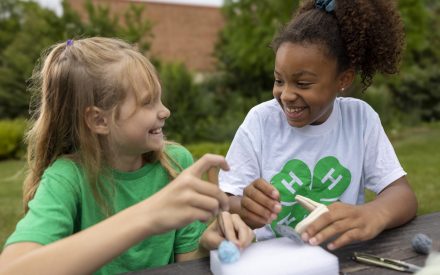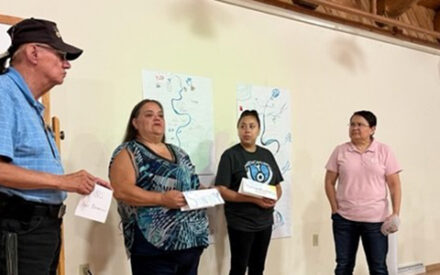All Wisconsin children deserve the opportunity to reach their full potential. Thriving childhoods are largely driven by everyday interactions with nurturing parents and caregivers. When parents feel confident in their caregiving role, they lay the foundation for their children to flourish across the lifespan.
Anyone raising children can benefit from research-based parenting practices applicable to everyday life. From appropriate expectations for growing children to effective discipline techniques, positive everyday parenting practices are the bedrock for optimal child growth and development and can prevent social and emotional difficulties. These everyday parenting practices are also powerful protectors against child abuse and neglect and can even buffer the impact of community violence and other major stressors, reducing financial costs to society.
Extension’s Family Engagement & Relationships Program serves children and parents in Wisconsin with the latest and best research available. We provide local and statewide parenting programs that are available to all Wisconsin families. By supporting everyday parenting, Extension lays the foundation for optimal development via parenting solutions grounded in science.
Learning for Everyday Parenting
In 2023, the Family Engagement & Relationships Program provided a continuum of programming to support everyday parenting practices for all Wisconsin parents and caregivers. From one-hour classes to a full-day conference to multi-week series, our programs were free, available virtually and in-person, and were grounded in the best science could offer Wisconsinites raising children.
In 2023 we sponsored the second annual Raising Wisconsin Children’s Conference, a free online event for parents and caregivers to access practical solutions about contemporary topics facing families. To reach new audiences, we partnered with state and local agencies, including the Mayo Clinic, the Wisconsin Alliance for Infant Mental Health, and the UW–Madison School of Human Ecology. To ensure participation from undeserved audiences, we worked extensively with Extension’s Office of Access, Inclusion, & Compliance to create bilingual marketing and registration materials and to offer language interpretation of all sessions in Spanish if requested. In 2023, 748 parents, caregivers, and early childhood professionals registered for the conference. Beginning on January 23 we provided nine conference sessions across five days. Attendance ranged from 23 to 198 per session, resulting in 760 educational contacts with parents and caregivers. After the conference, the recordings were available for one month receiving an additional 635 views. Following the conference, we offered weekly or monthly standalone classes that included a broad spectrum of everyday parenting topics such as brain development, social and emotional learning, emotion coaching, and more. We provided 24 classes across 11 months resulting in 417 educational contacts with parents and caregivers from over 30 Wisconsin counties.
We also offered several evidence-based Triple P Positive Parenting Program programs, typically delivered over the course of three to four weeks. These programs guided parents through everyday challenges and provided parenting solutions for anyone caring for toddlers through teens. Via a Baldwin Wisconsin Idea Grant and subsequent partnership with the Wisconsin Child Abuse and Neglect Prevention Board, we delivered a series of Triple P programs including classes for parents of children and teens, including those with disabilities, and for parents experiencing separation, divorce, or changes in the custody of their children. In 2023, we provided over 50 classes resulting in nearly 900 educational contacts with parents and caregivers across more than 40 counties.
Applying new Parenting Strategies
Across our educational programs, parents and caregivers received research-based information that supported everyday parenting practices. After the Raising Wisconsin’s Children conference, 44 participants responded to a survey, and 89% reported that the conference helped them understand how to positively support their children. Most said they would apply a new parenting strategy because of the conference. The impact of the conference rippled beyond parents and children to professionals who serve families. One professional who attended said: “I plan to share some of the tips … with the parents of autistic children I work with.”
The Raising Wisconsin’s Children series filled a need for quality information delivered in brief, one-hour sessions. Across 15 sessions we collected 109 post-class surveys. Overall, 80% found the classes very or extremely useful and 89% left the class with more ideas on how to positively parent their children. For example, many participants acquired concrete ideas about coaching children and teens through strong emotions. Participants spoke about observing and wondering about their children’s feelings and using a coaching method to encourage healthy emotion regulation in their children. Participants mentioned leaving with practical ideas for effective communication within their families and positive discipline strategies. Participants also reflected on the importance of routines and family plans, including using family values to structure screen time and other common parenting challenges.
Triple P participants were asked to take a post-class survey. In total, we received 315 surveys from over 200 parents and caregivers (some participants took more than one Triple P class). Parents overwhelmingly reported that Triple P provided new information that would improve their everyday parenting practices. For example, 99% learned something that would help make their family interactions more positive and 95% learned more about how their behavior affects their children. Many parents attend parenting classes when they have a challenge at home. Overall, 90% learned something in class that could help them with a parenting struggle. Parents were asked to share something they were going to try to do differently because of Triple P. Parents overwhelmingly described wanting to use more effective communication with their children, such as specific praise. Parents spoke about wanting to reduce their criticism and use encouragement. Parents intended to discuss their own emotions with their children and label and validate their children’s feelings. Parents also said they would implement more effective discipline and planned to actively engage their children in providing effective solutions to problems. Parents planned to use consistent discipline strategies that were immediate, intentional, and appropriately matched to their children’s behavior. Many planned to implement routines to set expectations and guide their children toward daily success. Overall, results suggest parents immediately internalized the main messages of the Triple P curricula and were able to articulate and plan for improvements in their everyday parenting practices.





